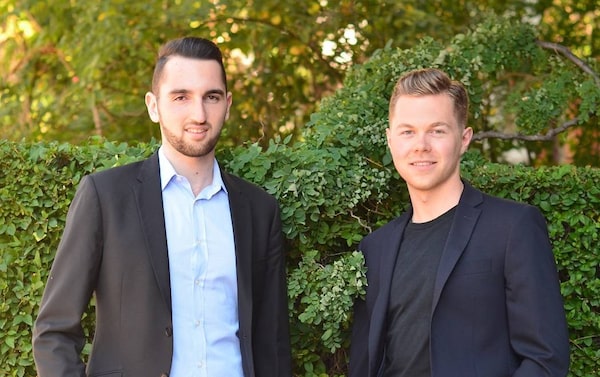
Cato Pastoll (Right) and Brandon Vlaar (Left) founded Lending Loop in 2015.
Brandon Vlaar knew that when he co-founded Toronto-based Lending Loop two years ago, his company would raise some eyebrows in the financial services space.
Built on a peer-to-peer online platform that's already proven successful in other countries, such as the U.S. and the U.K., Lending Loop connects small businesses looking for fair-interest loans with individuals who pool money to lend and earn a return from the loan interest. The problem was that provincial securities regulators saw Lending Loop as a securities dealer and pressed for the company to comply with extensive prospectus requirements.
"How Lending Loop works is [that] we have many people giving small amounts of money over the Internet in exchange for securities," explains Mr. Vlaar, chief technology officer at Lending Loop. "A big challenge for us was that there were no rules for peer-to-peer lending in Canada because no one had ever launched this kind of business here."
Mr. Vlaar and his co-founder, Lending Loop's CEO, Cato Pastoll, knew what they needed to do.
Before becoming business partners, the two had studied together as part of the honours business administration program at Western University's Ivey Business School in London, Ont. One of the classes that especially grabbed their attention had focused on research into how controversial or illegal companies, such as Uber and Bitcoin, had transformed their industries and either became successful eventually or paved the way for other companies because they quickly earned social acceptance among consumers.
Drawing heavily on what they learned in that class, Mr. Vlaar and Mr. Pastoll decided to shut down their business for eight months and worked with securities regulators to build a legal framework for peer-to-peer lending in Canada. Today, Lending Loop is registered in most parts of the country as an exempt market dealer.
"We understood through this class that we can successfully launch a disruptive business as long as it's socially acceptable and we have a path to make it legal," says Mr. Vlaar.
Lending Loop is proof positive of how academic research in business schools can be applied outside the classroom to create successful companies. At Ivey, the body of research covers a wide gamut of topics, from copycat manufacturing and cryptocurrencies to international trade relationships and wellness programs.
According to Jean-Philippe Vergne, associate professor of general management and strategy at Ivey, it's important for current and future business leaders to understand the deeper issues, strategies and history behind today's business models. This level of insight helps entrepreneurs and executives make better decisions based on real-world experiences in other companies and industries.
"For many years, my research has been about how socially contested organizations can change the rules and end up reshaping their industry," says Prof. Vergne, who teaches the class that helped Mr. Vlaar and Mr. Pastoll move their business forward. "I'm helping people understand how industries evolve by looking at gaps between what's illegal and legitimate, and how social acceptability creates opportunities for entrepreneurs.
"For example, I look at the issues of piracy and how it has changed the rules as far back as 17th-century international trade to the current rules of broadcasting, which were shaped in large part by pirate organizations such as Napster."
Business leaders should not underestimate the importance of academic research in their own work, says Henry Goldbeck, president of Goldbeck Recruiting Inc., a global executive firm headquartered in Vancouver. "The academic and business worlds are closely related, and theories go back and forth between these worlds," he says. "In many cases, a business model or strategy gets tried in the real world, then it's researched and propagated in the classroom, [and on] to business leaders who then take it back to the corporate world."
Mr. Goldbeck notes that most, if not all, of the world's best business schools adhere to case study-based curricula. "This allows successful – or even unsuccessful – models to get deconstructed, allowing other businesses to understand and apply the lessons from other companies' experiences," he says.
From a human resources perspective, business leaders whose knowledge is rooted in solid academic research can often gain a competitive advantage over their peers, says Mr. Goldbeck. "They're tapped into an ecosphere of knowledge that's developed both in a corporate environment and in academia. " Most business leaders will already be familiar with the success stories of other companies, but the academic research gives them that greater context and extra level of understanding."
At Lending Loop, the lessons taught in Mr. Vergne's class continue to guide the company's leaders. Now they're contributing to the lessons by coming in as guest speakers in Ivey's strategy and management classes. Last year, Mr. Vlaar asked Mr. Vergne's students to build a business case outlining the challenges and opportunities for Lending Loop and to come up with recommendations for the business.
The results were impressive, notes Mr. Vlaar. "We saw some very innovative ideas. I think it's interesting that after we used Jean-Philippe's research to inform our decisions for our company, we are now informing what's being discussed in the classroom."
This content was produced by The Globe and Mail's Globe Edge Content Studio. The Globe's editorial department was not involved in its creation.